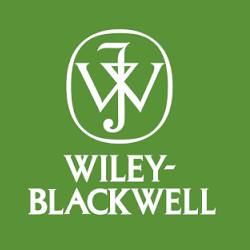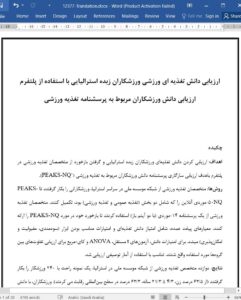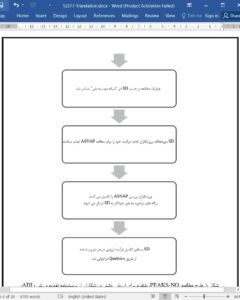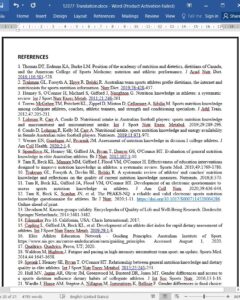Abstract
Aims To evaluate the nutrition knowledge of elite Australian athletes, and to obtain feedback from sports dietitians on the Platform to Evaluate Athlete Knowledge of Sports Nutrition Questionnaires' (PEAKS-NQ) suitability.
Methods Sports dietitians from the National Institute Network across Australia recruited athletes to complete the online, 50-item PEAKS-NQ which contained two sections (General Nutrition and Sports Nutrition). Sports dietitians provided feedback on the PEAKS-NQ using a 14-item questionnaire (with two open-ended items). The main outcome measures were nutrition knowledge score and tool suitability (usefulness, acceptability and feasibility) scores. For knowledge scores, independent t-tests, ANOVA and Chi-square tests were used to evaluate differences between groups. Suitability was evaluated using descriptive statistics.
Results Twelve sports dietitians from the National Institute Network in Australia recruited a convenience sample of 240 athletes (21.3 ± 4.3 years, 63.5% female, 63.3% competed internationally). Athletes scored 70.7 ± 10.5%, with better general vs sports nutrition knowledge. Females had higher overall scores (P < .001) with no differences for age or sport played. University-educated athletes scored higher than non-tertiary educated athletes (P = .004). Knowledge gaps were identified in fats (role and food sources), recovery nutrition and managing body composition. Sports dietitians rated suitability of PEAKS-NQ positively with complete agreement on 8 of 12 items.
Conclusions Athletes have greater understanding of general nutrition compared to sports nutrition concepts and may benefit from education on applying nutrition in sports-specific contexts. Sports dietitians' responses showed PEAKS-NQ was a highly acceptable, feasible and useful measure.
1 INTRODUCTION
Elite athletes have special nutrition requirements to optimally fuel, recover and adapt to their strenuous training demands.1 High levels of nutrition knowledge encompassing both general nutrition and sports nutrition domains provide the understanding to alter dietary intake to meet these needs. Australian athletes have previously indicated their preference for receiving nutrition information from dietitians,2 and therefore nutrition knowledge assessment can provide valuable insight into knowledge gaps, provide a way to appropriately “pitch” the difficulty of education interventions to maximise understanding, and allow practitioners to assess the effectiveness of education.3










